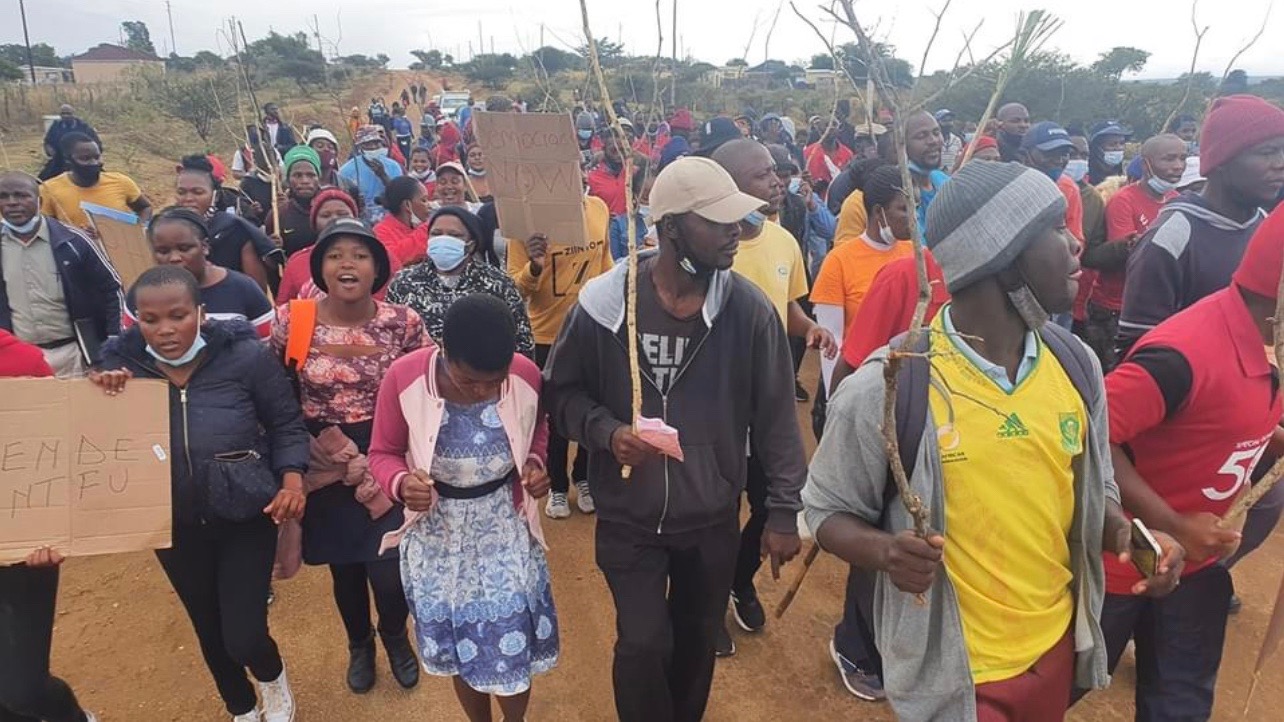On June 24, King Mswati III’s government in Swaziland imposed a ban on demonstrations, amidst an unprecedented country-wide wave of pro-democracy and anti-monarchy protests. For the first time, these protests are not limited to urban areas, but have also spread across rural Swaziland.
A call to defy the ban en masse and proceed with the protest marches as planned has been issued by the Communist Party of Swaziland (CPS). The party’s cadres are on the forefront of organizing their local communities to revolt against King Mswati III, the last absolute monarch on the continent.
“Most community members have already confirmed to us that they will be defying the ban and taking to the streets as planned,” Pius Vilakati, the international secretary of CPS, told Peoples Dispatch.
On Friday, June 25, residents of Mbabane (East) will march to the office of their Member of Parliament to deliver a petition of demands. Similar marches are planned in 15 more of Swaziland’s 59 constituencies on June 26.
The MPs from at least 25 constituencies have already been forced to accept petitions, including in the 15 constituencies where on June 19, residents marched to the offices of their MPs. A few hundreds to over a thousand protesters are estimated to have taken part in each of these marches.
In the Kukhanyeni Constituency, 25 kilometers to the north of Manzini city, protesters allegedly blocked a main road by lighting firewood and burning tires after delivering the petition, whereupon the police opened fire. Protesters were forced to disperse, but no injuries were reported as a result of the oppressive actions on June 19. These protests have come on the heels of a series of protests by students against police brutality.
By Saturday, the CPS hopes that the petitions will be delivered in 16 other constituencies which would leave only 20 constituencies of the total 59. In these remaining 20, cadres of the party are already organizing and mobilizing for marches in order to deliver similar petitions.
The struggle for a democratic Swaziland
Some of the demands in the petitions are specific to the issues faced in the particular constituencies. However, the common set of demands reflect an “overwhelming rejection of absolute monarchy rule and the call for a people’s government, particularly multiparty democracy and democratic ownership of the economy,” Pius said.
Under the control of the royal family, the national economy has turned Swaziland into the country with the most unequal wealth distribution in the world, according to a report released at the World Economic Forum Africa in 2017. In the backdrop of the poverty in which 70% of the population languish, the king continues to spend billions of dollars every year on grand festivities, palaces, jewels, a fleet of Rolls Royce cars, private jets and other indulgences of the royal family.
While the severely underfunded hospitals had been running out of medicines well before the onset of the pandemic, little checks and balances exist in the system to stop the monarchy from wasting resources on vanity projects like the International Conference Centre Ezulwini, to build which the government is borrowing a loan of US$83 million from Taiwan.
Therefore, democratization of the economy – along with a socially guaranteed healthcare and education – is a crucial demand on which as much stress is laid as on the demand for the right to elect the Prime Minister. Currently the PM is appointed by the king, who also appoints the ministers of the cabinet, the top jurists, 2/3rds of the upper house of the parliament and 12% of the lower house.
While the remaining members of the parliament are elected from the constituencies (known in SiSwati as tinkhundla), the democratic character of these elections are compromised. Each inkhundla (the native language singular for constituency) is divided into several chiefdoms. The chiefs, who administer their respective chiefdoms at the behest of the king without being conferred any authority through popular vote, vet the candidates who intend to participate in the election.
Only those who are approved by the chiefs can contest in this election, as individuals, and not as representatives of any groups or political parties. Political parties have been banned in Swaziland since 1973, when the then Prince Mswati’s father, King Sobhuza II, suspended the constitution, dissolved the legislature and assumed absolute power.
While freedom of association is recognized in law, protests and strikes are often met with a heavy hand by security forces. Charges under Suppression of Terrorism Act are frequently used to persecute activists and union leaders. Nevertheless, protests by students unions and trade unions, particularly those of civil servants, are commonplace in the cities of Mbabane and Manzini.
As these protests were largely limited to urban areas, the monarchy had been accustomed to responding to these actions by concentrating the coercive power of security forces against them. This time, however, with the protests throughout the rural areas where 70% of the population is spread out, the “security forces are stretched to the limit”, explained Pius.
He however clarified caution against complacency, adding that “with the power that the monarchy holds, there is no way its defeat will be easy or even possible by mere negotiation. The Communist Party advocates for unity of the masses for a nationwide mass uprising.” These protests, he explained, is a “crucial” milestone in the journey towards the uprising.
“Thus far, the trade union movement has not directly participated in these actions, though workers are taking part in their individual capacities as members of their communities,” Pius added. “We call upon the Trade Union Congress of Swaziland (TUCOSWA) to mobilize its unions and join the marches.”





